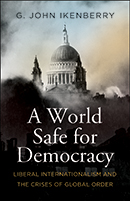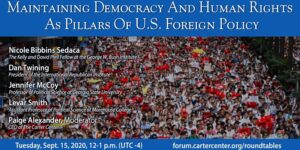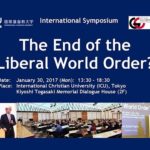
Former Secretary of State Madeleine Albright. Credit: NDI
In 1998, then-US Secretary of State Madeleine Albright famously defined the United States as “the indispensable nation,” notes Ana Palacio, a former minister of foreign affairs of Spain and a visiting lecturer at Georgetown University. Two decades later, the US remains the indispensable nation. And yet, rather than seeing into the future, it has lately seemed to have its eyes closed, she writes for Project Syndicate:
What the US can still do is mobilize diverse international actors to address shared challenges. Unless the US heals its divisions, however, even this “convening power”…. is likely to be eroded in the medium to long term. ….Convening power is more nuanced than raw hegemonic power. It rests not only on capacity and influence, but also on a sense of moral authority that attracts partners and infuses shared action with legitimacy.
A convening power must set an example of liberalism and multilateralism, not just make demands, Palacio asserts.
 2020 will long be remembered as a year of crisis and disaster, of pandemic and recession, and of illiberalism and democratic decline, notes a leading analyst. It is also a moment when the basic foundations of global order threatened to give way. The world stands at a crossroads. The US must seize this opportunity to relaunch the liberal international project, writes Princeton University’s John Ikenberry.
2020 will long be remembered as a year of crisis and disaster, of pandemic and recession, and of illiberalism and democratic decline, notes a leading analyst. It is also a moment when the basic foundations of global order threatened to give way. The world stands at a crossroads. The US must seize this opportunity to relaunch the liberal international project, writes Princeton University’s John Ikenberry.
“Liberal democracies have a unique capacity to cooperate because their common values reinforce trust and solidarity,” he asserts. “Liberal democracies also have an extra reason to work together because rising economic and security interdependence generates both opportunities and dangers.”
“This time around, internationalism will be a world-weary and pragmatic search for cooperative solutions to global dangers. It is no longer the triumphant march of liberal democracy,” adds Ikenberry, author of A World Safe for Democracy: Liberal Internationalism and the Crises of World Order (Yale, 2020). “It means connecting liberal internationalism to the everyday lives of everyday people. It is about managing the complexities of economic and security interdependence in the pursuit of national well-being.”
Renewed ideological debate
But if the world’s democracies can’t coordinate responses against Saudi Arabia when it egregiously violates international norms, their chances of doing so against China are slim, POLITICO reports.
 The shift in the international environment over the past few years from the post-Cold War era to an era of renewed great power competition has led to a renewed ideological debate about the relative merits of Western-style democracy versus 21st -century forms of authoritarian and illiberal government, says a recent report from the Congressional Research Service.
The shift in the international environment over the past few years from the post-Cold War era to an era of renewed great power competition has led to a renewed ideological debate about the relative merits of Western-style democracy versus 21st -century forms of authoritarian and illiberal government, says a recent report from the Congressional Research Service.
The traditional U.S. role in the world since World War II can be described in general terms as consisting of four key elements:
global leadership;
defense and promotion of the liberal international order;
defense and promotion of freedom, democracy, and human rights; and
prevention of the emergence of regional hegemons in Eurasia.
 With respect to the second element, the report adds, the U.S. “has been described as pursuing an internationalist foreign policy; a foreign policy of global engagement or deep engagement; a foreign policy that provides global public goods; a foreign policy of liberal order building, liberal internationalism, or liberal hegemony; an interventionist foreign policy; or a foreign policy of seeking primacy or world hegemony.”
With respect to the second element, the report adds, the U.S. “has been described as pursuing an internationalist foreign policy; a foreign policy of global engagement or deep engagement; a foreign policy that provides global public goods; a foreign policy of liberal order building, liberal internationalism, or liberal hegemony; an interventionist foreign policy; or a foreign policy of seeking primacy or world hegemony.”
“The potential issue for Congress is whether, in a period of renewed ideological competition, there is now once again a need for focusing more on the question of whether the operation of U.S. democracy is being viewed positively or otherwise by observers in other countries,” the authors add.
Newly-elected US Senator John Hickenlooper has also affirmed his commitment to advancing democracy. “I will support and speak out for democracy abroad rather than pretend we have no stake in its global success,” he told the Chicago Council on Global Affairs (below).







